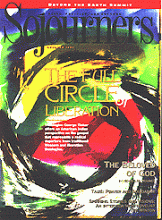In June 1981, 12,000 members of the Professional Air Traffic Controllers Organization (PATCO) went on strike. They were all summarily fired by then-President Ronald Reagan.
It was an act that reverberated throughout the country and permanently changed labor relations in the United States, a change for which workers have paid dearly. In the decade since PATCO, union membership has declined, and--arguably as a direct result wages have fallen and the standard of living for most Americans has plummeted.
A brief survey of some recent labor struggles illustrates clearly the problems American workers face. In Brooklyn, New York, a group of 200 Haitian immigrants working in a used-clothing factory, the Domsey Trading Corp., went on strike in 1990 after the company fired several union activists.
Working at minimum wage and subject to sexual and racial harassment, these workers were forced to wear badge numbers. The employers refused to use the workers' names, referring to them only by numbers. It took a court order to force Domsey to rehire its workers after the 18-month strike ended. Charges filed by the workers against the company have not been settled yet.
In the coal fields of southwest Virginia, workers at the Pittston Coal Company were forced to strike in 1989 after the company refused to negotiate in good faith and cut off health benefits for retired and disabled miners. In New York City, the Daily News management locked out workers in 1990 and forced them into a bitter six-month strike. More recently, Caterpillar broke a five-month strike in Peoria, Illinois, by threatening and advertising to replace the entire work force.
Read the Full Article

